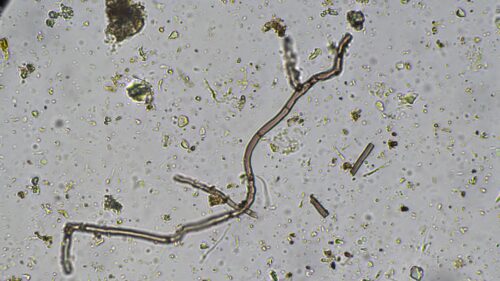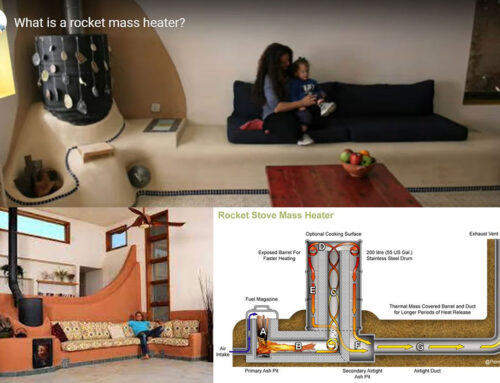This article was written by guest-author Gregory Munn co-founder of Catalyst Bioamendments and Soil Consultant in Nevada City, CA.
The Microscopic Miracle of Fungi in Our Soils
The microscopic community of soil borne organisms is of vast diversity and complex interactions. Beneath our feet is an invisible world where the most important activities on earth are happening, we call this place Soil. If we as a human society, would acknowledge one aspect of the earth to give praise for our fragile existence, it is the soil. Soil is the foundation of our entire modern complex society. It produces food that gives energy to the people that drive the system forward.
Microorganisms in the soil are the star of the show when it comes to soil function and overall soil health, yet for so long we have paid great attention to the mineral components of soil and less to the function of microorganisms. Bacteria and fungi are what we call primary decomposers. These organisms have the capacity to chemically decompose organic matter and parent material, basically the geological component of soils. The process of decomposing OM and minerals will release nutrients into plant available forms, this critical process is called nutrient cycling.
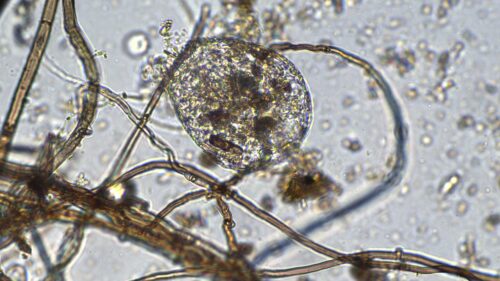

 In this photo, at the center is a protist (Testate Amoebae), being surrounded by a healthy network of decomposer fungi. (Photo taken by; Keisha Wheeler/Soil Microbe Library)
In this photo, at the center is a protist (Testate Amoebae), being surrounded by a healthy network of decomposer fungi. (Photo taken by; Keisha Wheeler/Soil Microbe Library)
Fungi play a critical role in crops of all kinds, unlocking nutrients, providing protection from pathogen and disease, stimulating plant immunity and so on. Mycorrhizal fungi are different from decomposer fungi by the way they associate with the plant and form a direct relationship with the roots. This superstar organism is supported by decomposer fungi in the bulk soil to bring the unlocked nutrients directly to the plant as needed, as well as stimulate photosynthesis and a host of other plant functions.
If we can begin to practice management techniques in our gardens, crops and landscapes that support these organisms and their functions, we can greatly decrease our use of harmful chemicals that pose a serious risk to human and environmental health.
At this point you might be saying, I agree with all of this, but what exactly can I do about it? This concept of working with fungi and other microbes to support healthy landscapes, gardens and largescale crops is practical and relatively easy. The best way to get started is by Composting!
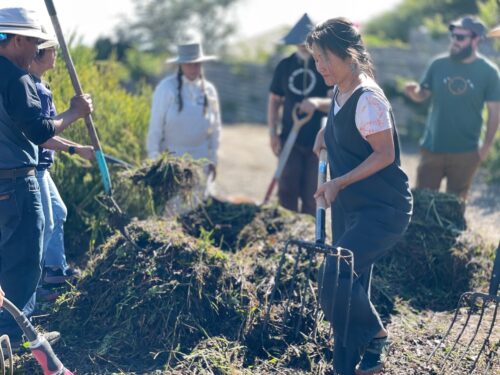

 A group of students in turning process at a Catalyst composting workshop (Photo credit; Catalyst BioAmendments LLC)
A group of students in turning process at a Catalyst composting workshop (Photo credit; Catalyst BioAmendments LLC)
Composting is the process of creating ideal conditions for aerobic microbes to thrive. Bacteria, fungi, protozoa, nematodes, microarthropods and earthworms. Our goal is aerobic composting, which means plenty of oxygen is available for your organisms to decompose organic matter. There are many ways to compost; thermophilic, static or vermicompost, its best to consider the pros and cons of each method before beginning to construct your pile.
Thermophilic: This method can reach temperatures of up to 160 degrees and will require you to monitor and turn your compost pile multiple times until it cools in temperature. The pros are: rapid decomposition, termination of pathogenic microorganisms and weed seeds while retaining and growing the beneficial microbes. The cons are: requires the correct mixture of materials including manures, daily monitoring, multiple mixings or turnings and plenty of water.
Static Composting: Is a blend of carbon-based materials such as fallen leaves, woodchips, dead plants from the summer garden, dead standing grasses and annuals. Pros: Requires much less turning and water, should not reach high temperatures and requires less monitoring, pile can be constructed relatively easy with commonly available materials. Cons: Decomposition is much slower, pathogens and weed seeds can remain after decomposition. Adding food waste from the kitchen is not advised as this can turn the compost anaerobic producing plant pathogens.
Vermicomposting: You will have to source composting worms to get this process started. Worms are very efficient in breaking down OM with the help of their bacterial partners in composting. Pros: Very effective in decomposing kitchen scraps. Creates a nice nutrient rich soil amendment and potting mix additive. Decomposes fast and consistently so you can harvest useable castings quickly. Cons: Requires daily attention, consistent additions of foods, moisture and temperature must remain at optimal levels.
Regardless of the method that best fits your lifestyle, the goal is to sustain optimal conditions in your compost pile for the entire lifespan, until the compost is utilized. Microbes are our growing partners, helping us protect and feed our plants. With proper composting we can achieve a rich microbial inoculant and plant food, which can be used in place of harmful chemicals. We can do this by using materials collected from our own land and community.
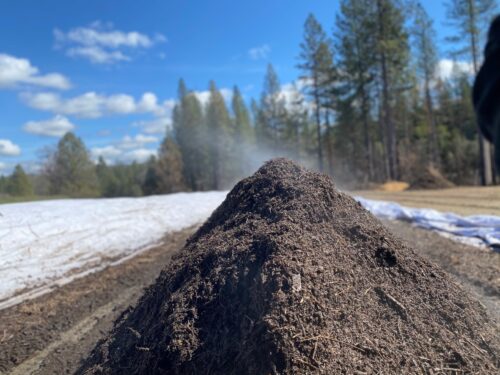

 Composting using the windrow technique at Catalyst BioAmendments (Photo credit; Catalyst BioAmendments LLC)
Composting using the windrow technique at Catalyst BioAmendments (Photo credit; Catalyst BioAmendments LLC)
Enjoy some microscopic pictures of microbes below and a picture from our workshop on composting!
Interested in some cool gear with microbes? Check out our store here>>
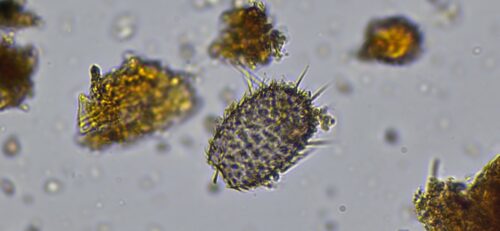


Forest Protozoa
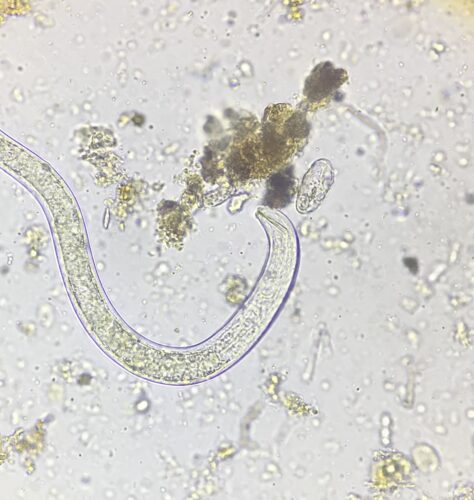


Nematode
| 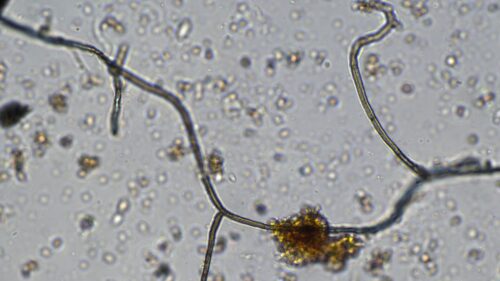   |
Decomposer Fungi
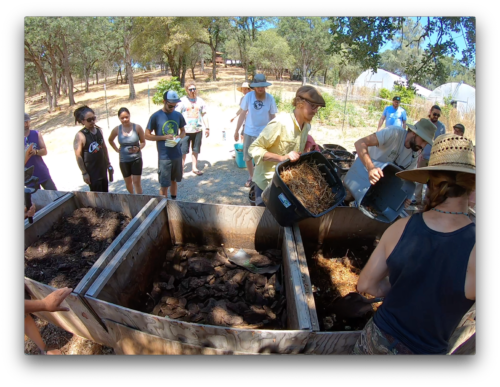


Compost Workshop, Northern California – Chico, Oroville, Paradise, CA
At Catalyst BioAmendments we strive to make the highest quality, diverse microbial inoculant available to our community. We have many successful trials and research projects utilizing our product in crops such as; Viticulture, orchard crops, cannabis, row crop farms, landscape management and forest restoration projects. Our compost is available to the public and we also offer delivery. We also host composting workshops! Please find us online at www.catalystbioamendments.com or email us @ catalystbioamendments@gmail.com
We offer compost tea application services with the capacity to cover backyard gardens or large-scale commercial operations. Please contact us for details and scheduling at gregory@catalystbioamendments.com



About the author: Hello my name is Gregory Munn, co-founder of Catalyst BioAmendments. I was born and raised in the Sierra Foothills of California. I have been studying soil ecology and regenerative agriculture for 7 years. My passion is to provide an alternative to harmful land and crop management techniques. Catalyst BioAmendments was founded with the goal of creating a diverse microbial inoculant for famers. We have successful alternatives to conventional crop management and I believe it is time to make the change.


